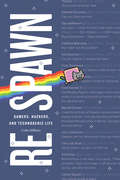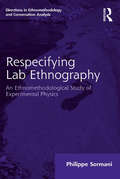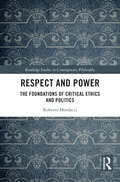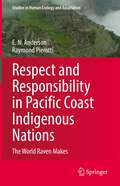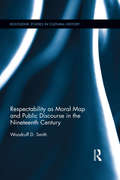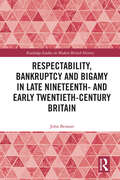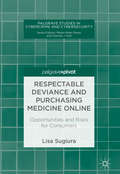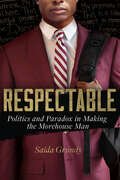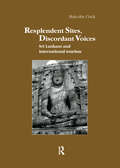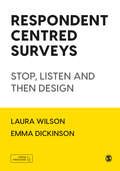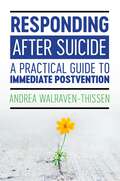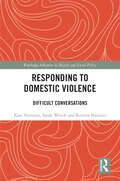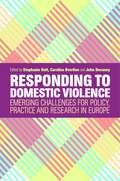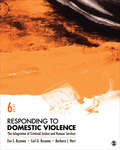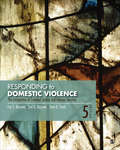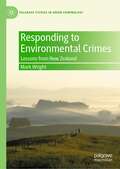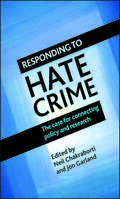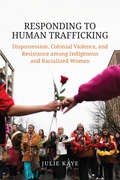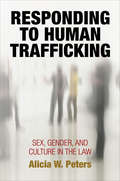- Table View
- List View
Respawn: Gamers, Hackers, and Technogenic Life (Experimental Futures)
by Colin MilburnIn Respawn Colin Milburn examines the connections between video games, hacking, and science fiction that galvanize technological activism and technological communities. Discussing a wide range of games, from Portal and Final Fantasy VII to Super Mario Sunshine and Shadow of the Colossus, Milburn illustrates how they impact the lives of gamers and non-gamers alike. They also serve as resources for critique, resistance, and insurgency, offering a space for players and hacktivist groups such as Anonymous to challenge obstinate systems and experiment with alternative futures. Providing an essential walkthrough guide to our digital culture and its high-tech controversies, Milburn shows how games and playable media spawn new modes of engagement in a computerized world.
Respecifying Lab Ethnography: An Ethnomethodological Study of Experimental Physics (Directions in Ethnomethodology and Conversation Analysis)
by Philippe SormaniRespecifying Lab Ethnography delivers the first ethnomethodological study of current experimental physics in action, describing the disciplinary orientation of lab work and exploring the discipline in its social order, formal stringency and skilful performance - in situ and in vivo. Drawing upon extensive participant observation, this book articulates and draws upon two major strands of ethnomethodological inquiry: reflexive ethnography and video analysis. In bringing together these two approaches, which have hitherto existed in parallel, Respecifying Lab Ethnography introduces a practice-based video analysis. In doing so, the book recasts conventional distinctions to shed fresh light on methodological issues surrounding the descriptive investigation of social practices more broadly. An engaged and innovative study of the encountered worksite, this book will appeal not only to sociologists with interests in ethnomethodology and the sociology of work, but also to scholars of science and technology studies and those working in the fields of ethnography and social science methodology.
Respect Yourself, Protect Yourself: Latina Girls and Sexual Identity (Intersections #14)
by Lorena GarciaExploring young Latina youth's sexual agency, education, and expressionWhile Latina girls have high teen birth rates and are at increasing risk for contracting sexually transmitted infections, their sexual lives are much more complex than the negative stereotypes of them as “helpless” or “risky” (or worse) suggest. In Respect Yourself, Protect Yourself, Lorena Garcia examines how Latina girls negotiate their emerging sexual identities and attempt to create positive sexual experiences for themselves. Through a focus on their sexual agency, Garcia demonstrates that Latina girls’ experiences with sexism, racism, homophobia and socioeconomic marginality inform how they engage and begin to rework their meanings and processes of gender and sexuality, emphasizing how Latina youth themselves understand their sexuality, particularly how they conceptualize and approach sexual safety and pleasure. At a time of controversy over the appropriate role of sex education in schools, Respect Yourself, Protect Yourself, provides a rare look and an important understanding of the sexual lives of a traditionally marginalized group.
Respect and Power: The Foundations of Critical Ethics and Politics (Routledge Studies in Contemporary Philosophy)
by Roberto MordacciThis book presents a historically informed, theoretically systematic, and critically articulated theory of respect that challenges many of the presuppositions of the current debate in ethics and politics. It develops a theory of respect as the rule of power relations, which draws connections between Kant’s critical philosophy and Critical Theory.The concept of respect is the foundation of normative theory. Any human practice is subject to a judgment in terms of respect, and a comprehensive theory is needed to critically assess our individual and social practices. This book elaborates an uncommon understanding of respect through a historical reconstruction of the practices of respect and a theoretical analysis of the limits of current theories of respect. Power is the fundamental force at work in social relations, and respect is the recognition of power with a critical stance that defines how power is to be used and regulated. A close confrontation with Hannah Arendt’s and Michel Foucault’s conceptions of power offers the opportunity to clarify in which sense respect is the rule of power relations. This also helps to overcome the anthropocentric bias inherent in many theories of respect. It is important to recognize that living beings and nature possess power, and that we must acknowledge this and understand the limitations of our power over them.Respect and Power will appeal to researchers and graduate students working in moral and political philosophy, political theory, critical theory, and the social sciences.
Respect and Responsibility in Pacific Coast Indigenous Nations: The World Raven Makes (Studies in Human Ecology and Adaptation #13)
by Raymond Pierotti E. N. AndersonThis book examines ways of conserving, managing, and interacting with plant and animal resources by Native American cultural groups of the Pacific Coast of North America, from Alaska to California. These practices helped them maintain and restore ecological balance for thousands of years. Building upon the authors’ and others’ previous works, the book brings in perspectives from ethnography and marine evolutionary ecology. The core of the book consists of Native American testimony: myths, tales, speeches, and other texts, which are treated from an ecological viewpoint. The focus on animals and in-depth research on stories, especially early recordings of texts, set this book apart. The book is divided into two parts, covering the Northwest Coast, and California. It then follows the division in lifestyle between groups dependent largely on fish and largely on seed crops. It discusses how the survival of these cultures functions in the contemporary world, as First Nations demand recognition and restoration of their ancestral rights and resource management practices.
Respectability as Moral Map and Public Discourse in the Nineteenth Century (Routledge Studies in Cultural History #53)
by Woodruff D. SmithDespite the fact that respectability is universally recognized as a feature of nineteenth-century society, it has seldom been studied as a subject in itself. In this path-breaking book, Woodruff D. Smith interprets respectability as a highly significant cultural phenomenon, incorporating both a moral imaginary or map and a distinctive discourse. Respectability was constructed in the public spheres of Europe and the Americas and eventually came to be an aspect of social life throughout the world. From its origins in the late eighteenth century, it was a conscious response to what were perceived as undesirable aspects of modernity. It became a central feature of concepts of "the modern" itself and an essential part of the processes that, in the twentieth century, came to be called modernization and cultural globalization. Respectability – though typically associated with the bourgeoisie – existed independently of any particular social class, and strongly affected modern constructions of class in general and of gender. Although not an ideology, respectability was overtly embedded in several political discourses, especially those of movements such as antislavery which claimed to transcend politics. While it may no longer be a coherent entity in culture and discourse, respectability continues to affect contemporary public life through a fragmentary legacy.
Respectability, Bankruptcy and Bigamy in Late Nineteenth and Early Twentieth-Century Britain (Routledge Studies in Modern British History)
by John BensonRespectability, Bankruptcy and Bigamy in Late Nineteenth and Early Twentieth-Century Britain explores the vexed question of middle-class respectability in Victorian and Edwardian Britain. It focuses upon the life of London solicitor Hamilton Pawley (1860–1936), who was barred from working by the Law Society, twice declared bankrupt, and in 1919 was sentenced to eighteen months’ imprisonment with hard labour for bigamously marrying a woman practically forty years his junior. If Pawley did not suffer the revenge of respectable society, it is difficult to think who would. Drawing upon the fact that the disgraced and the disreputable have always tended to attract a disproportionate amount of attention, the book ranges widely, exploring such important issues as middle-class education, career choices, the dynamics of family life, and the workings of the late nineteenth and early twentieth-century legal system. It shows that Pawley was able to hold on to his professional – and even gentlemanly – status for far longer than seemed likely. This all suggests, the book concludes, that although respectability was as important to the middle class as we have always been told, it was both easier to acquire and easier to retain than we have generally been led to believe. This book will appeal to all those interested in British society in the late nineteenth and early twentieth centuries.
Respectable Citizens
by Lara A. CampbellHigh unemployment rates, humiliating relief policy, and the spectre of eviction characterized the experiences of many Ontario families in the Great Depression. Respectable Citizens is an examination of the material difficulties and survival strategies of families facing poverty and unemployment, and an analysis of how collective action and protest redefined the meanings of welfare and citizenship in the 1930s.Lara Campbell draws on diverse sources including newspapers, family and juvenile court records, premiers' papers, memoirs, and oral histories to uncover the ways in which the material workings of the family and the discursive category of 'respectable' citizenship were invested with gendered obligations and Anglo-British identity. Respectable Citizens demonstrates how women and men represented themselves as entitled to make specific claims on the state, shedding new light on the cooperative and conflicting relationships between men and women, parents and children, and citizen and state in 1930s Canada.
Respectable Deviance and Purchasing Medicine Online
by Lisa SugiuraThis is a unique interdisciplinary exploration of the contemporary phenomenon of online medicine purchasing. In this research, Sugiura provides a criminological understanding of the sale of online medicines as well as the traditional illegal markets. Crucially, the practice is investigated from the perspective of web users, moving beyond the headlines and warning campaigns to contextualise the provision of medicines online, to describe this practice and subjective accounts of purchasing medicines from the Web. Drawing together established deviance theories, Respectable Deviance and Purchasing Medicine Online considers the construction of online medicine purchasing, the justifications presented to challenge how it is labelled, and how the behaviour is managed to show how the framing of risks and deviance is challenged online. Offering a much-needed a critical overview of the UK healthcare regulatory system, Sugiura also analyses literature, data and policy documents originating from different countries highlighting that the geographical locations of participants in web forums, online surveys and non-face-to-face interviews cannot always be verified. With broad implications for regulation and safety surrounding medicines online, this innovative and timely study contributes to current online healthcare debates and broadens our understanding of cybercrime. It will be of particular interest to scholars of cybercrime and those interested in the changing nature of deviance.
Respectable: Politics and Paradox in Making the Morehouse Man
by Saida GrundyThe making of a culture of Black male respectability at Morehouse that underlines conservative notions of gender and class—by a former Spelman student who was once "Miss Morehouse." How does it feel to be groomed as the "solution" to a national Black male "problem"? This is the guiding paradox of Respectable, an in-depth examination of graduates of Morehouse College, the nation's only historically Black college for men. While Black male collegians are often culturally fetishized for "beating the odds," the image of Black male success that Morehouse assiduously promotes and celebrates is belied by many of the realities that challenge the students on this campus. Saida Grundy offers a unique insider perspective: a graduate of Spelman college and a former "Miss Morehouse," Grundy crafts an incisive feminist and sociological account informed by her personal insights and scholarly expertise.Respectable gathers the experiences of former students and others connected to Morehouse to illustrate the narrow, conservative vision of masculinity molded at a competitive Black institution. The thirty-two men interviewed unveil a culture that forges confining ideas of respectable Black manhood within a context of relentless peer competition and sexual violence, measured against unattainable archetypes of idealized racial leadership. Grundy underlines the high costs of making these men—the experiences of low-income students who navigate class issues at Morehouse, the widespread homophobia laced throughout the college's notions of Black male respectability, and the crushingly conformist expectations of a college that sees itself as making "good" Black men. As Morehouse's problems continue to pour out into national newsfeeds, this book contextualizes these issues not as a defect of Black masculinity, but as a critique of what happens when an institution services an imagination of what Black men should be, at the expense of more fully understanding the many ways these young people see themselves.
Resplendent Sites, Discordant Voices: Sri Lankans and International Tourism (Studies in Anthropology and History #Vol. 8)
by Malcolm CrickFirst Published in 1994. Studies in Anthropology and History is a series that will develop new theoretical perspectives, and combine comparative and ethnographic studies with historical research. The notion that tourism is the largest industry in the world seems to have acquired a wide currency over the past few years. This book looks at the recent growth of anthropological interest in tourism with suggestions as to some key issues where anthropological interests and tourism coincide; using field work and investigations in Sri Lanka.
Respondent Centred Surveys: Stop, Listen and then Design
by Laura Wilson Emma DickinsonAchieve your survey goals by empowering your survey respondents. Too often, surveys are designed for the analyst, rather than the respondent. This book challenges the status quo by putting respondents’ needs at the heart of survey development. It encourages you to stop, listen, and then design to improve response rates and collect high quality data. Drawing on their experience at the UK Office for National Statistics, the authors: Show you how to design better surveys by combining social research and user experience best practice. Equip you with the tools to design inclusive and accessible surveys. Enable you to overcome practical research problems, including managing participant recruitment, and working to any budget. Provide links to helpful web material and further reading as part of the book′s online resources. Promoting a new way to conceptualise and conduct survey design, this book expands your theoretical thinking and shows you, step-by-step, how to put it into practice.
Respondent Centred Surveys: Stop, Listen and then Design
by Laura Wilson Emma DickinsonAchieve your survey goals by empowering your survey respondents. Too often, surveys are designed for the analyst, rather than the respondent. This book challenges the status quo by putting respondents’ needs at the heart of survey development. It encourages you to stop, listen, and then design to improve response rates and collect high quality data. Drawing on their experience at the UK Office for National Statistics, the authors: Show you how to design better surveys by combining social research and user experience best practice. Equip you with the tools to design inclusive and accessible surveys. Enable you to overcome practical research problems, including managing participant recruitment, and working to any budget. Provide links to helpful web material and further reading as part of the book′s online resources. Promoting a new way to conceptualise and conduct survey design, this book expands your theoretical thinking and shows you, step-by-step, how to put it into practice.
Responding After Suicide: A Practical Guide to Immediate Postvention
by Andrea Walraven-ThissenThis practical guide about what first responders should do after a suicide, offers advice on identifying and recording a death as suicide, breaking the bad news and dealing with the impact of suicide in the short, middle and long term.Drawing on her own experience as a first responder and trainer, the author provides guidance and tips for best practice when responding to a suicide. These include what can happen to the body in the immediate aftermath, how to talk to the bereaved to limit or prevent secondary trauma, and how to manage suicide in public arenas such as schools. The scenarios covered include detailed scripts of how to deal with difficult situations. There are also sections that tackle complex issues such as religious or cultural customs, and unusual cases of suicide which can pose extra challenges.Straightforward and full of sage advice, each chapter includes real-world examples from the author's many years working as a first responder which highlight how suicide postvention techniques can be applied.
Responding to Domestic Violence: Difficult Conversations (Routledge Advances In Health And Social Policy Ser.)
by Kristin Natalier Sarah Wendt Kate SeymourThis book reflects on the problem of domestic violence by thinking critically about policy and practice responses. Moving beyond accounts of men’s violence embedded in metaphors of ‘good’ and ‘bad men’, or as the expressions of particular structures and practices, it initiates challenging conversations concerning the ways in which our embeddedness in gendered discourses shapes the responses that we imagine are possible and desirable. Innovative in its embrace of feminist poststructural theorising to both challenge and enrich responses to men’s use of domestic violence, each chapter is dedicated to exploring a particular area of tension, unpicking the tangles and knots of complexity that characterise much domestic violence policy and practice. Case studies ground the chapters, providing a focus for thinking through the dilemmas, challenges, and contested nature of ideas, meanings, and practices in this space. Rather than presenting easy answers, each chapter provides a forum for the exploration of ambiguity and complexity – to acknowledge the discomfort and sit with this, not rush to resolve it. Situated within this contested, uncomfortable terrain, this book presents a small – but important – step towards a reimagining of the ways in which we think about and respond to domestic violence. It will be of interest to scholars and students of gender studies, sociology, health, and social care.
Responding to Domestic Violence: Emerging Challenges for Policy, Practice and Research in Europe
by Elizabeth Martin Julie Taylor Stephanie Holt Per Moum Hellevik Gene Feder John Devaney Dr Declan Coogan Carolina Øverlien Joanna Goodey Philip McCormack Zuzana Ocenasova Hana Smitkova Claire Houghton Sibel Korkmaz Maria Pentaraki Nicola McConnell Matt Barnard Nusha Yonkova Gloria Kirwan Dalila Cerejo Els Leye Ingunn Rangul Askeland Marius Råkil Lucy Potter Gemma Carney Davina James-HanmanThis book offers a critical overview of established and emerging manifestations of domestic violence across Europe. It describes how countries within and outside the EU are responding to the problem in policy, practice and research. Eminent academics and professionals from a range of European countries share their findings from new groundbreaking victim surveys, and weigh up the legal, social and healthcare challenges. The issues addressed include: - the cultural challenges of combating abuse forms most prevalent in migrant communities such as female genital mutilation and forced marriage; - emerging problems such as child-to-parent violence, teenage relationship violence and digital intimate partner abuse; and - barriers to help-seeking faced by marginalised victims such as LGBTQ and older people. By showcasing the most effective responses formulated in Europe and exploring innovative ways to research and understand domestic violence, this book is a crucial resource for all those with responsibility for implementing social policy and good practice.
Responding to Domestic Violence: The Integration of Criminal Justice and Human Services
by Eve S. Buzawa Carl G. Buzawa Barbara J. HartA fresh look at the response to domestic violence in the United States today by experts in their field. Responding to Domestic Violence explores the response to domestic and intimate partner violence by the criminal justice system as well as public and non-profit social service and health care agencies. After providing a brief theoretical overview of the causes of domestic violence and its prevalence in society, the expert author team covers such key topics as barriers to intervention, variations in arrest practices, the role of state and federal legislation, and case prosecution. Focusing on both survivors and offenders, the book provides a thorough exploration of modern strategies to address the realities and needs of all survivors. The new edition offers new chapters on Special Populations at Risk, Victim Services, Coercive Control, Intimate Partner Stalking, and Civil and Criminal Protection Orders. All remaining chapters have been substantially or completely rewritten to reflect the growing body of research in the field.
Responding to Domestic Violence: The Integration of Criminal Justice and Human Services
by Eve S. Buzawa Carl G. Buzawa Barbara J. HartA fresh look at the response to domestic violence in the United States today by experts in their field. Responding to Domestic Violence explores the response to domestic and intimate partner violence by the criminal justice system as well as public and non-profit social service and health care agencies. After providing a brief theoretical overview of the causes of domestic violence and its prevalence in society, the expert author team covers such key topics as barriers to intervention, variations in arrest practices, the role of state and federal legislation, and case prosecution. Focusing on both survivors and offenders, the book provides a thorough exploration of modern strategies to address the realities and needs of all survivors. The new edition offers new chapters on Special Populations at Risk, Victim Services, Coercive Control, Intimate Partner Stalking, and Civil and Criminal Protection Orders. All remaining chapters have been substantially or completely rewritten to reflect the growing body of research in the field.
Responding to Domestic Violence: The Integration of Criminal Justice and Human Services
by Eve S. Buzawa Carl G. Buzawa Evan D. StarkThis new edition of the bestselling Responding to Domestic Violence explores the response to domestic violence today, not only by the criminal justice system, but also by public and non-profit social service and health care agencies. After providing a brief theoretical overview of the causes of domestic violence and its prevalence in our society, the authors cover such key topics as barriers to intervention, variations in arrest practices, the role of state and federal legislation, and case prosecution. Focusing on both victims and offenders, the book includes unique chapters on models for judicial intervention, domestic violence and health, and children and domestic violence. In addition, this edition provides an in-depth discussion of the concept of coercive control in domestic violence and its importance in understanding victim needs. Finally, this volume includes international perspectives in order to broaden the reader's understanding of alternative responses to the problem of domestic violence.
Responding to Domestic Violence: The Integration of Criminal Justice and Human Services
by Eve S. Buzawa Carl G. Buzawa Evan D. StarkThis new edition of the bestselling Responding to Domestic Violence explores the response to domestic violence today, not only by the criminal justice system, but also by public and non-profit social service and health care agencies. After providing a brief theoretical overview of the causes of domestic violence and its prevalence in our society, the authors cover such key topics as barriers to intervention, variations in arrest practices, the role of state and federal legislation, and case prosecution. Focusing on both victims and offenders, the book includes unique chapters on models for judicial intervention, domestic violence and health, and children and domestic violence. In addition, this edition provides an in-depth discussion of the concept of coercive control in domestic violence and its importance in understanding victim needs. Finally, this volume includes international perspectives in order to broaden the reader's understanding of alternative responses to the problem of domestic violence.
Responding to Environmental Crimes: Lessons from New Zealand (Palgrave Studies in Green Criminology)
by Mark WrightThis book provides a critical study of environmental regulation and its enforcement in New Zealand, situated within green criminology. It seeks to address the question of whether the offences in the Resource Management Act 1991 are 'working', by drawing on a range of sources including: central government data, local government policies and reports on enforcement, information requests of councils, studies of local authority enforcement behaviour and case law to. Through highly layered and richly textured analysis, the project exposes the problems that can arise when an expansive approach is taken to offences, penalties and institutional arrangements in an environmental regulatory statute. It emphasizes how discussions of harm and what should be unlawful will ensure that law-makers' enforcement tools will align with their goals for punishment. It examines higher-level issues such as ‘wrongfulness’ and ‘criminality’ in the environmental regulatory context and explores the relevance of its findings to jurisdictions outside of New Zealand. It also discusses the pros and cons of criminalisation and punishment versus restoration. It speaks to those interested in green criminology, regulatory compliance and enforcement, and applications of criminal law.
Responding to Global Poverty
by Christian Barry Gerhard ØverlandThis book explores the nature of moral responsibilities of affluent individuals in the developed world, addressing global poverty and arguments that philosophers have offered for having these responsibilities. The first type of argument grounds responsibilities in ability to avert serious suffering by taking on some cost. The second argument seeks to ground responsibilities in the fact that the affluent are contributing to such poverty. The authors criticise many of the claims advanced by those who seek to ground stringent responsibilities to the poor by invoking these two types of arguments. It does not follow from this that the affluent are meeting responsibilities to the poor. The book argues that while people are not ordinarily required to make large sacrifices in assisting others in severe need, they are required to incur moderate costs to do so. If the affluent fail consistently to meet standards, this fact can substantially increase the costs they require to bear to address it.
Responding to Hate Crime: The Case for Connecting Policy and Research
by Neil Chakraborti and Jon GarlandWhy has so much hate crime policy seemingly ignored academic research? And why has so much research been conducted without reference to policy? This book bridges the gap between research and policy by bringing together internationally renowned hate crime experts from the domains of scholarship, policy and activism. It provides new perspectives on the nature of hate crime victimisation and perpetration, and considers an extensive range of themes, challenges and solutions which have previously been un- or under-explored. In doing so, the book offers innovative ways of combating and preventing hate crime that combine cutting-edge research with the latest in professional innovations. Essential reading for students, academics and practitioners working across a range of disciplines including criminology, sociology and social policy, Responding to Hate Crime makes a clear and compelling case for closer and more constructive partnerships between scholars and policy makers.
Responding to Human Trafficking: Dispossession, Colonial Violence, and Resistance among Indigenous and Racialized Women
by Julie KayeResponding to Human Trafficking is the first book to critically examine responses to the growing issue of human trafficking in Canada. Julie Kaye challenges the separation of trafficking debates into international versus domestic emphases and explores the tangled ways in which anti-trafficking policies reflect and reinforce the settler-colonial nation-building project of Canada. In doing so, Kaye reveals how some anti-trafficking measures create additional harms for the individuals they are trying to protect, particularly migrant and Indigenous women. The author’s critical examination draws upon theories of post- and settler-colonialism, Indigenous feminist thought, and fifty-six interviews with people in counter-trafficking employment across Western Canada. Responding to Human Trafficking provides a new framework for critical analyses of anti-trafficking and other rights-based and anti-violence interventions. Kaye disrupts measures that contribute to the insecurity experienced by trafficked women and individuals affected by anti-trafficking responses by pointing to anti-colonial organizing and the possibilities of reciprocity in relationships of care.
Responding to Human Trafficking: Sex, Gender, and Culture in the Law (Pennsylvania Studies in Human Rights)
by Alicia W. PetersSigned into law in 2000, the Trafficking Victims Protection Act (TVPA) defined the crime of human trafficking and brought attention to an issue previously unknown to most Americans. But while human trafficking is widely considered a serious and despicable crime, there has been far less consensus as to how to approach the problem—owing in part to a pervasive emphasis on forced prostitution that overshadows repugnant practices in other labor sectors affecting vulnerable populations. Responding to Human Trafficking examines the ways in which cultural perceptions of sexual exploitation and victimhood inform the drafting, interpretation, and implementation of U.S. antitrafficking law, as well as the law's effects on trafficking victims.Drawing from interviews with social workers and case managers, attorneys, investigators, and government administrators as well as trafficked persons, Alicia W. Peters explores how cultural and symbolic frameworks regarding sex, gender, and victimization were incorporated into the drafting of the TVPA and have been replicated through the interpretation and implementation of the law. Tracing the path of the TVPA over the course of nearly a decade, Responding to Human Trafficking reveals the profound gaps in understanding that pervade implementation as service providers and criminal justice authorities strive to collaborate and perform their duties. Ultimately, this sensitive ethnography sheds light on the complex and wide-ranging effects of the TVPA on the victims it was designed to protect.
